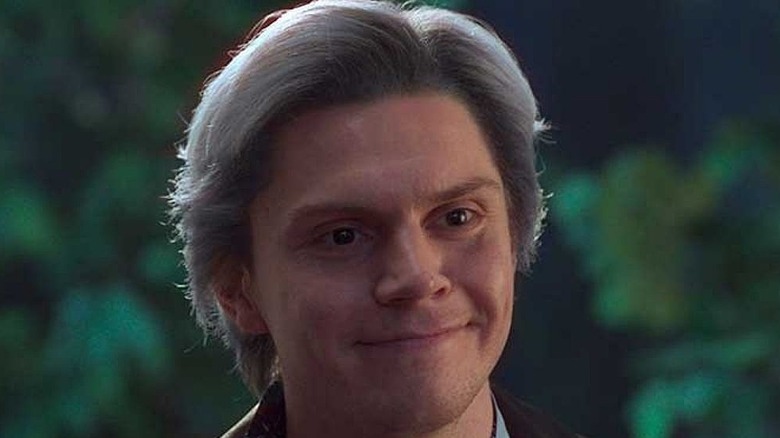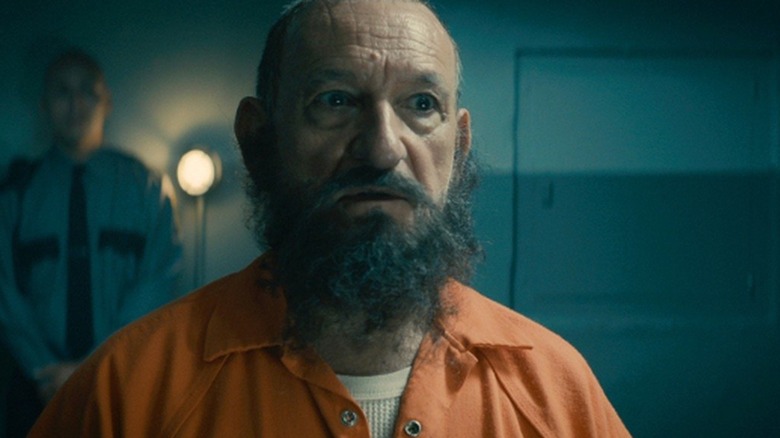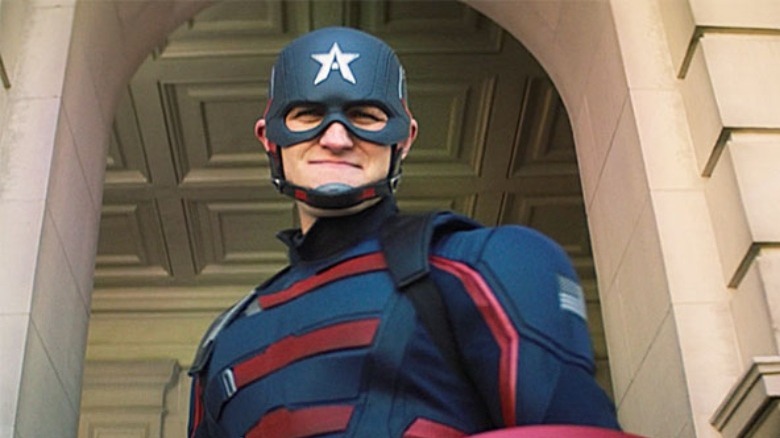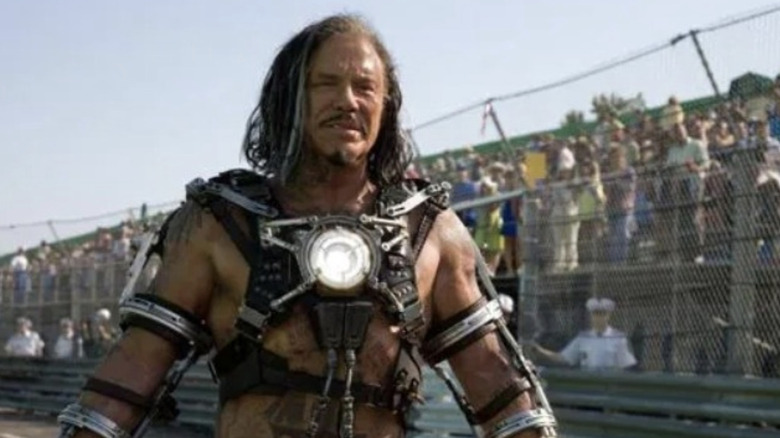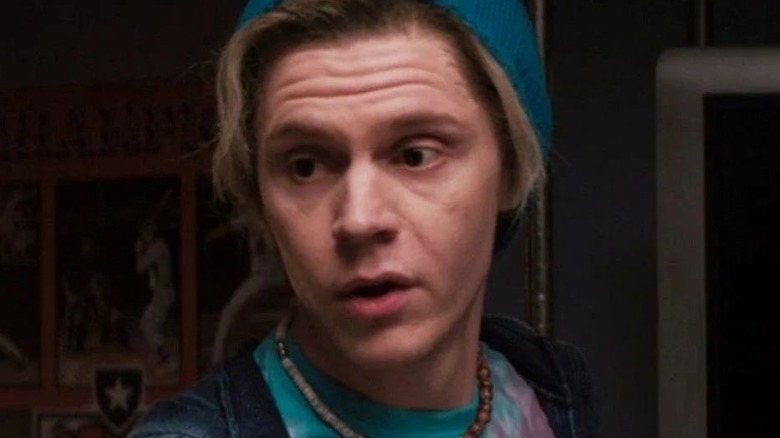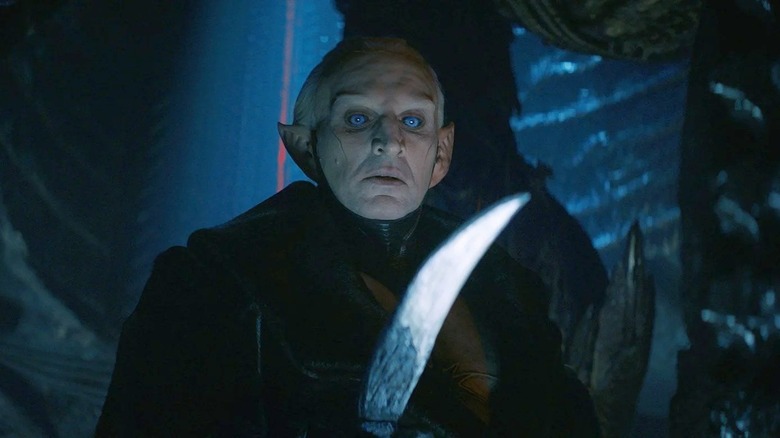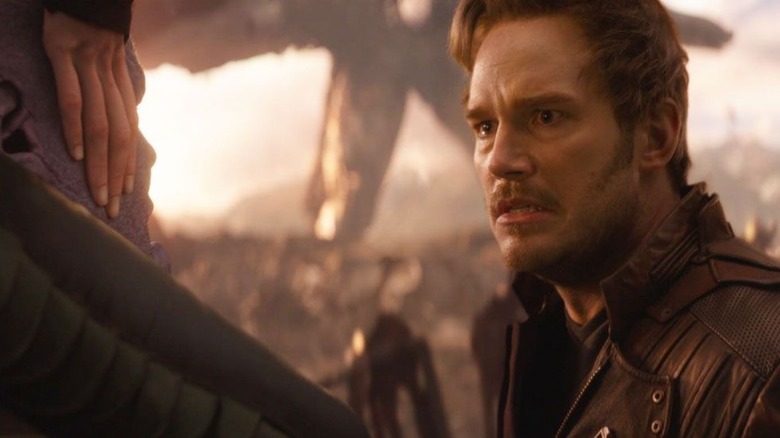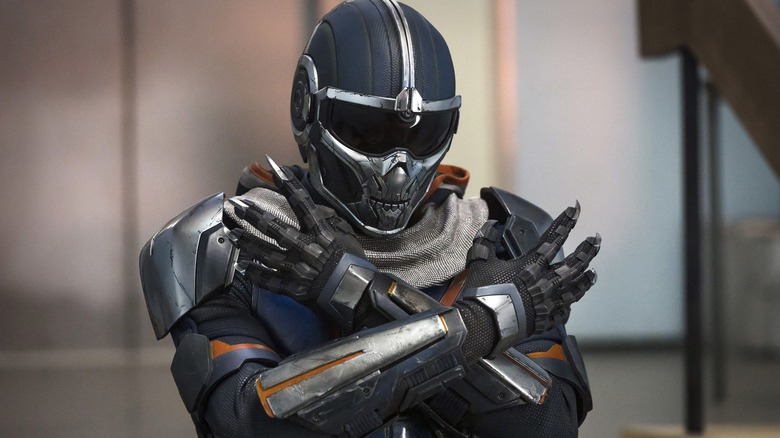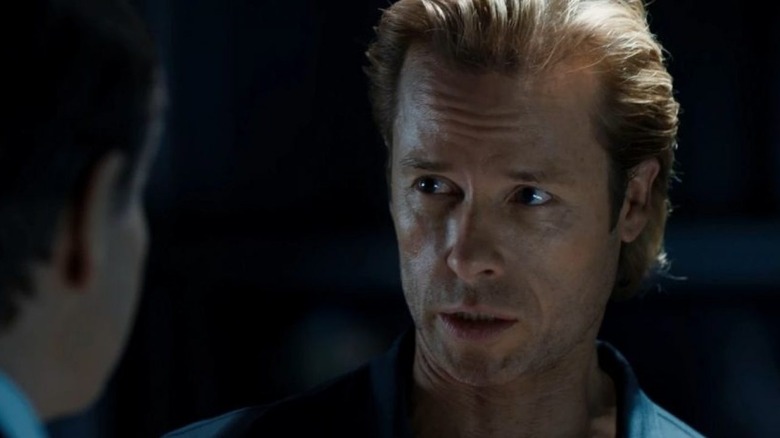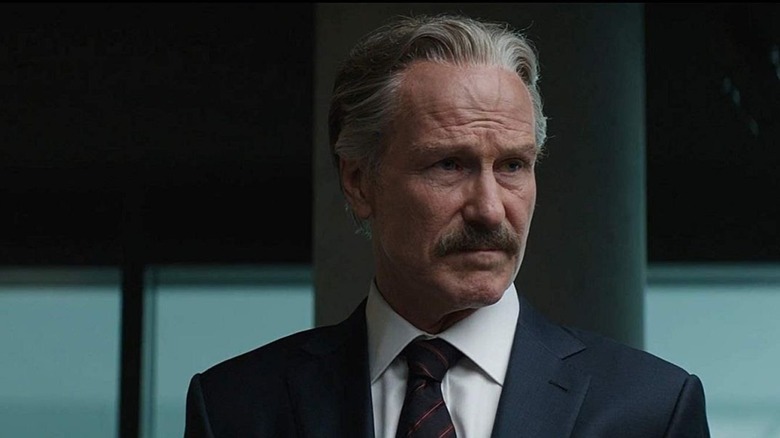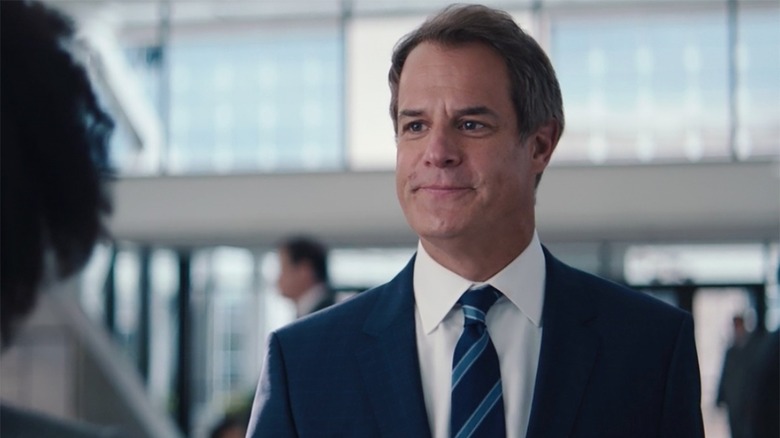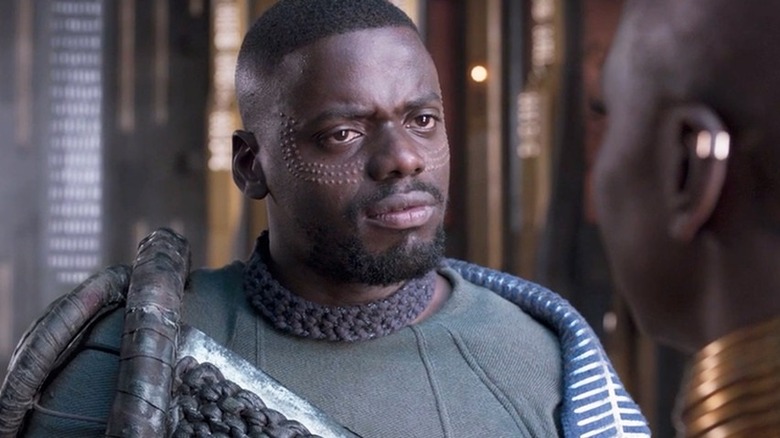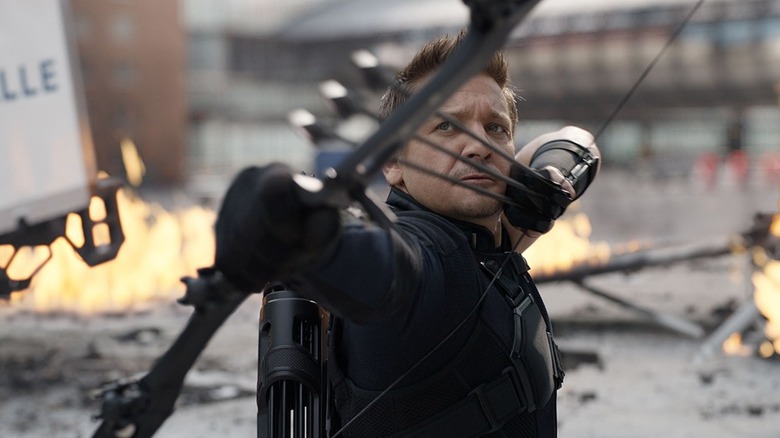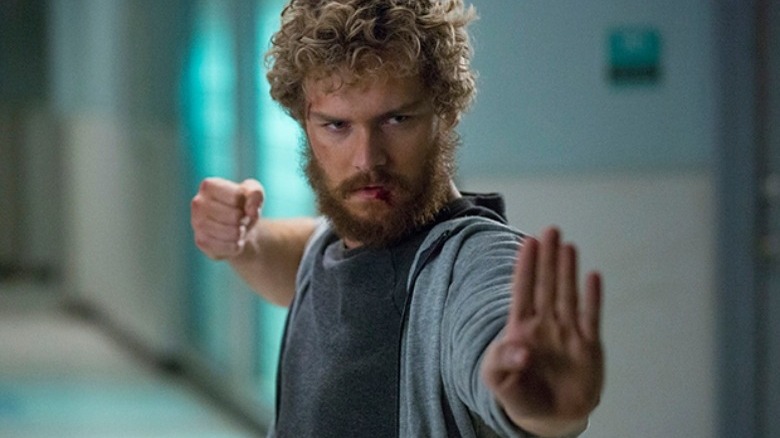MCU Characters Fans Can't Stand
Whether you love the Marvel movies or can't stand them, there's no getting around the indelible mark they've made on our cultural landscape. In particular, the films of the Marvel Cinematic Universe (MCU) have succeeded in making once obscure gun-toting raccoons and time-traveling warlords as much household names as the most beloved athletes and movie stars of our time.
But as popular as the MCU's films and TV series are, not all of its characters enjoy the same adoration as Robert Downey Jr.'s Tony Stark or Chris Evans' Steve Rogers. Whether they're good guys, bad guys, or somewhere in between, there are plenty of characters in the MCU fans have serious problems with, often for different reasons. Fans feel betrayed by some characters and completely underwhelmed by others. Sometimes they find the characters annoying, and still other times beloved characters make mistakes fans just can't forgive. Wherever they fall, here are MCU villains, heroes, and everyone else that fans just can't stand.
A lot of fans hated being tricked by Trevor Slattery
In the lead-up to 2013's "Iron Man 3," Ben Kingsley was advertised as playing the Mandarin — the eponymous hero's comic book arch-nemesis. While we see threatening videos of the so-called Mandarin in the first couple of acts, it isn't until over halfway through the film that Tony Stark finally comes face to face with the "villain." Ironically, when he famously says in his first video "you'll never see me coming," he isn't kidding.
Instead of a formidable mastermind armed with alien technology, Tony Stark finds a drug-addled actor slurring his speech and nodding off while Stark has a gun to his head. Instead of the Mandarin, Kingsley plays Trevor Slattery — a front for the true villain, Aldrich Killian (Guy Pearce).
While some fans took the reveal as the fun surprise it was meant to be, others were not so happy. CinemaBlend's Sean O'Connell went so far as to not only say "real fans" should be angry over the twist, but trashed other writers on the site for posting positive takes on it. Days after the film premiered, Business Insider reproduced tweets from fans, a few of which praised the movie except for the twist. Even three years later, director Shane Black told UPROXX that Marvel made the short "Marvel One-Shot: All Hail the King" — in which Slattery is kidnapped from prison to answer to the unseen "real" Mandarin — as an apology to fans for the hated twist.
There's no mystery about why no one likes John Walker
While he would later give everyone plenty of other more concrete reasons to hate him, it really didn't take more than his smug smile at the end of the first episode of "The Falcon and the Winter Soldier" for the whole of Marvel fandom to hate John Walker (Wyatt Russell). With the exception of the occasional comic fan who wondered why Bucky (Sebastian Stan) didn't get a chance to wield the shield before Sam Wilson (Anthony Mackie) — since he had done so in the source material — most were expecting Sam to take up the Captain America mantle. To learn not only that he had set the shield aside, but that this new, unknown quantity had claimed it was too much for some fans to endure quietly.
The hate Russell received online in the wake of taking the role not only didn't surprise him, he was counting on it. Speaking to Esquire (via ScreenRant) in April 2021, Russell said the inevitable fan hate was part of why he liked the idea of stepping into the role. "You elicit that response," Russell said, "and then it's like great, it's working." He added that he hoped viewers would come to understand there was a "gray area" around Walker, "and that in life, there's gray area all around us every day."
Whiplash didn't impress anybody
In general, 2010's "Iron Man 2" is one of the least-liked MCU flicks, and one of the many reasons is the unremarkable bad guy Ivan Vanko, aka Whiplash (Mickey Rourke). While in some cases you can blame the poor realization of a comic book villain on the actor playing them, in the case of Whiplash it's really hard to consider anyone responsible but director Jon Favreau and screenwriter Justin Theroux.
First, there's the choice of Whiplash as a villain, the announcement of which made the entire Marvel fandom call out in unison, "Who?" Then there's his grand revenge plan — to kill Tony Stark as he races in the Monaco Grand Prix, even though Tony's decision to drive in the race is spur-of-the-moment and there's no way Vanko could've known about it. Third, there's the fact that his cobbled together chest piece offers any protection against being hammered by Happy's (Jon Favreau) car several times, considering he's got more skin exposed than He-Man.
It isn't just fans who can't stand Vanko — Rourke himself still complains about how the finished product turned out, while trashing Marvel's other films.
Ralph Boehner's fan club membership is small
Among the many Marvel projects that inspired fans to craft their own intricate theories about what was "really" going on, "WandaVision" may very well reign supreme. Along with complex hypotheses involving Mephisto, Ultron, Wonder Man, Nightmare and more was the theory that "WandaVision" would mark the introduction of mutants into the MCU. This latter theory gained more momentum than any other at the end of "On a Very Special Episode..." when Wanda (Elizabeth Olsen) believes her dead brother Pietro has returned, except rather than being played by Aaron Taylor-Johnson, it's Evan Peters — who played Fox's version of the character in their "X-Men" film franchise — who shows up at her door.
But, regardless of how passionate fans felt about their theories, this new Quicksilver proves to not have anything to do with a predicted merging of the MCU and Fox's "X-Men" canon. Peters was not playing Quicksilver, but instead a man named Ralph Boehner, mystically disguised by Agatha Harkness (Kathryn Hahn) to look like Wanda's dead brother. As chronicled by The Independent, many fans felt betrayed by the reveal, including those who decried Marvel using Peters "for a boner joke," and one fan who said the studio somehow "overhyped" the actor's appearance even though his introduction was a surprise.
Malekith could have been so much more
With the introduction of Loki (Tom Hiddleston) in 2011's "Thor," fans met one of the MCU's greatest villains, and one of the most enduringly popular characters in the entire narrative. In sharp contrast, with 2013's "Thor: The Dark World," audiences meet Malekith (Christopher Eccleston), one of the most disappointing antagonists in the MCU.
Fans and critics alike complained that the Dark Elf villain was underdeveloped, unremarkable, and that the performances of two otherwise superb actors — Eccleston and Adewale Akinnuoye-Agbaje who plays the powerhouse Kurse — were buried under layers of CGI and makeup. For these reasons and others, "The Dark World" is generally ranked among the worst MCU entries.
For his part, Eccleston doesn't seem to disagree very strongly with fans and, according to him, has a lot more reasons to be angry about the film than most. On a 2017 episode of "The Graham Norton Show" (via Digital Spy), Eccleston claimed Marvel was dishonest with him about the many hours it would take for him to get into makeup every day. The following year, speaking to the Guardian, the actor compared working on "The Dark World" to having "a gun in your mouth."
Star-Lord ruined everything (or half of everything)
Few characters have been blamed as hard for their screw-ups as Star-Lord (Chris Pratt) was in the aftermath of 2018's "Avengers: Infinity War."
In case you've already forgotten: on Titan, the combined forces of the Avengers and the Guardians of the Galaxy almost defeat Thanos (Josh Brolin). With elements of futuristic technology, magic, and brute strength working together, the heroes have Thanos pinned. Mantis (Pom Klementieff) enters the fray and keeps Thanos incapacitated with her mental powers, but just barely. Spider-Man and Iron Man are seconds away from removing the Infinity Gauntlet from the villain's hand when a grief-stricken Star-Lord — just discovering Thanos murdered Gamora (Zoe Saldana) — goes wild and attacks the Titan. His assault is enough to wake Thanos from Mantis' mental hold.
A lot of Marvel fans were not particularly forgiving about Star-Lord's mistake. A torrent of accusatory memes followed the release of "Infinity War," along with tweets like those from @TaPeR_GanG_r who wrote "Starlord can stay dead Btw" and @JWIMYS who called Peter Quill a "turnstile superhero."
The hate got to the point that Pratt responded to the backlash in May 2018 while speaking to RadioTimes. Pratt pointed out all the loss his character had experienced up to that point, concluding Quill's actions were "very human." Pratt added, "And also, I blame Thanos, OK?" Jokingly, he asked, "Geez, how come he's not getting any blame?"
Taskmaster had interesting abilities and not much else
Whether fans loved or hated 2021's "Black Widow," few were happy with the realization of Taskmaster (Olga Kurylenko), who wields the impressive ability to copy any combat skills she sees. While in the comics Taskmaster is a mercenary named Tony Masters, in the film she's revealed to be Antonia Dreykov, the daughter of the main villain (Ray Winstone).
As recorded by sites like BuzzFeed and Event Hubs, the hate for Taskmaster is unique in that it truly runs the gamut. For example, a lot of disapproval comes from fan reactions to the differences between the source material and the film. Not only because the Taskmaster of "Black Widow" is a different character entirely with a different name, gender, and origin, but she has completely different characteristics and motivations. Taskmaster is a relatively charismatic and talkative villain in the comics, while the movie counterpart literally says nothing while fighting the heroes.
But at the same time, even fans who were happy with the differences between page and screen were disappointed that the character seemed so severely underdeveloped, while getting precious little screen time.
Aldrich Killian is no more the Mandarin than Trevor
Guy Pearce is a wonderful actor who did great work with his character in "Iron Man 3," but it doesn't stop Aldrich Killian from making little sense. He wants revenge on Tony Stark for that old New Year's Eve humiliation, in spite of the fact that he's already rich and powerful. He wants military contracts, so he creates a fake terrorist figurehead and tries to assassinate the president? There are easier ways to make a buck, especially when you've already got a way to give people super powers. What, the military wouldn't condone his unethical methods? Does anyone remember how Steve Rogers got his powers? Or the Abomination? Or Isaiah Bradley? Should we keep going?
Then of course there's the reveal that he's the "real" Mandarin, which honestly doesn't feel any more genuine than Trevor Slattery. Sure, it makes sense that he's the film's real villain, but he's just as far removed from the character of the source material as Slattery. All he has in common with the Mandarin of the comics is that he fights Iron Man. If that's all you need to be the Mandarin, then at least half of the Avengers roster could call themselves the Mandarin — along with Whiplash, Obadiah Stane, Loki, and a whole bunch of Chitauri soldiers.
If audiences didn't hate Secretary Ross, he wouldn't be doing his job
There may be no more hated supporting character in all of the MCU than Secretary Thaddeus "Thunderbolt" Ross, who's been played wonderfully by William Hurt since 2008's "Incredible Hulk." It's an impressive feat for the actor, considering how against type the role is. Hurt built his screen-acting career playing the same kinds of intellectuals Ross' daughter Betty (Liv Tyler) would date — i.e. the kind Ross would absolutely loathe. Heck, in some corner of the multiverse where the MCU sprang into bloom in the '80s, Hurt may very well be playing Bruce Banner.
But in our part of the multiverse, Hurt plays a guy fans hate because they're supposed to hate them. Graduating from a Hulk-hunting army general to Secretary of State in 2016's "Captain America: Civil War," it's Ross who brings the Sokovia Accords to the Avengers' conference room. And in a film known for superheroes beating the tar out of one another, Ross winds up hated by both sides before the end. Between that and his subsequent appearances, he's essentially become the MCU version of the ornery police captain always trying to rein in the hero cop and get him to "play ball."
Tyler Hayward does everything he can to make us hate him
If you trust S.W.O.R.D. director Tyler Hayward (Josh Stamberg) when he first shows up, you're in the minority. The tension between Hayward and Monica Rambeau (Teyonah Parris) — who would likely have his job if she hadn't been taken out by Thanos' snap — is intense as soon as we meet him in Episode 4 of "WandaVision," but then again we've been fooled before. Every now and then in a movie or TV show, we get a pencil-pushing bureaucrat who surprises us by not being an amoral, short-sighted jerk who cares about nothing but his own upward mobility. But Hayward fails to surprise us in this way.
Proving to be just as corrupt as he is annoying, Hayward not only resurrects the body of Vision to act as his own sentient weapon — something the literally Earth-shattering events of "Avengers: Age of Ultron" should have proven to Hayward is an amazingly bad idea — but also attempts to murder the Maximoff family. If there's anything surprising about Hayward it's that — in spite of his position and influence — he gets the cuffs slapped on him in the end.
W'Kabi comes off as one of the pettiest Wakandans
Erik Killmonger (Michael B. Jordan) remains one of the most sympathetic villains, if not the most, in all of the MCU. While, like the men who murder his father, he commits horrible crimes to achieve his goals, he believes in their righteousness. The film is filled with characters harboring different ideas about what the "right" thing is and fighting with everything in them for whatever that proves to be. Among such characters, W'Kabi (Daniel Kaluuya) comes off as little more than an opportunistic jerk.
W'Kabi is visibly smug and satisfied when Killmonger is first revealed in the throne room to T'Challa (Chadwick Boseman), and he sides with Killmonger — even against his own wife, Okoye (Danai Gurira) — in the film's final battle. It's no surprise we don't find him fighting alongside his fellow Wakandans in either "Infinity War" or "Endgame."
A deleted scene released in May 2018 may have actually made W'Kabi more likable to fans. Taking place shortly after Killmonger defeats T'Challa and assumes the Wakandan throne, the scene shows a tense exchange between W'Kabi and Okoye. Among other things, the audience learns just how much pain W'Kabi still suffers over the deaths of his parents at the hands of Ulysses Klaue (Andy Serkis), who T'Challa fails to bring back to Wakanda with him.
Hawkeye doesn't always hit the bullseye
Hawkeye gets a lot of disrespect and it isn't hard to understand why. He's an archer fighting alongside gods, monsters and super soldiers. Ryan Reynolds' Deadpool disses him hard in 2018's "Deadpool 2" when — with his healing powers suppressed — he says, "My super power is just unbridled cancer. Give me a bow and arrow and I'm basically Hawkeye."
Renner has been known to get in on the fun himself, both canonically and otherwise. Hosting "Saturday Night Live" in September 2012, Renner played Hawkeye in a sketch mocking the hero for being limited to his archery. Three years later, in the climactic battle of "Age of Ultron," Hawkeye quips to Wanda, "The city is flying and we're fighting an army of robots. And I have a bow and arrow. Nothing makes sense."
Part of the problem could be Hawkeye's strange introduction to the MCU. Hawkeye doesn't get more than a cameo until 2012's "Avengers." In an interview that year with Games Radar, Renner admitted he was unhappy with how his character spends most of that movie under Loki's mind control. Renner explained that in the film he "isn't even really a bad guy, because there's not really a consciousness to him."
If nothing else, seeing Clint Barton tear through crooks with a sword in 2019's "Avengers: Endgame" hopefully cured fans of the opinion he's only an archer. His upcoming Disney+ series may boost his popularity as well.
Iron Fist was the first Marvel Netflix bomb
In retrospect, it's tough to not feel sorry for Finn Jones, who played the titular hero in Netflix's "Iron Fist." When he was cast, the actor was coming off "Game of Thrones" and seemed to be a young star on the rise — but before Season 1 even aired, both Jones personally and the show in general weathered a whitewashing controversy that got so heated that Jones eventually jumped ship from Twitter.
The first season feels rushed in order to set up "The Defenders" — an idea heavily supported by Jones telling Metro in March 2017 that the filming schedule was so tight he was often not learning the choreography for fight scenes until 15 minutes before they were shot. That rushed feel helped "Iron Fist" become the first of Marvel's Netflix shows to be critically panned, with fans singling out the overly-edited fight scenes as disappointing cover-ups for a perceived lack of martial artistry.
Not to mention that in spite of Danny Rand having the most mystical origin of all the Netflix Marvel heroes, the series never took advantage of this. For example, when the BBC talked to fans in the wake of the series' cancellation, comic book fan Ian Newport rightly pointed out that in spite of Rand getting his powers by ripping out the heart of a dragon — something that could make for an amazing visual — it was never shown in the series.
